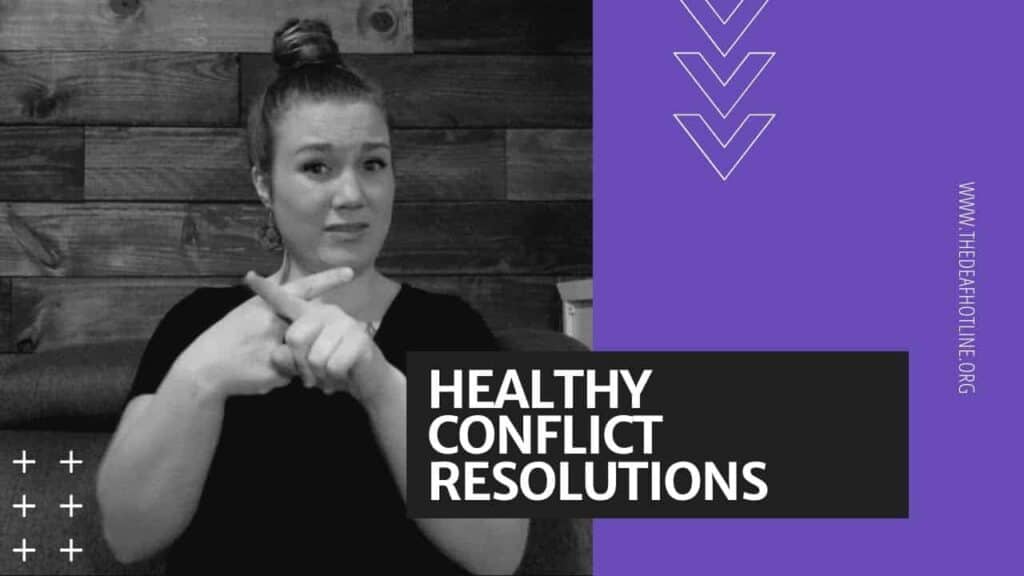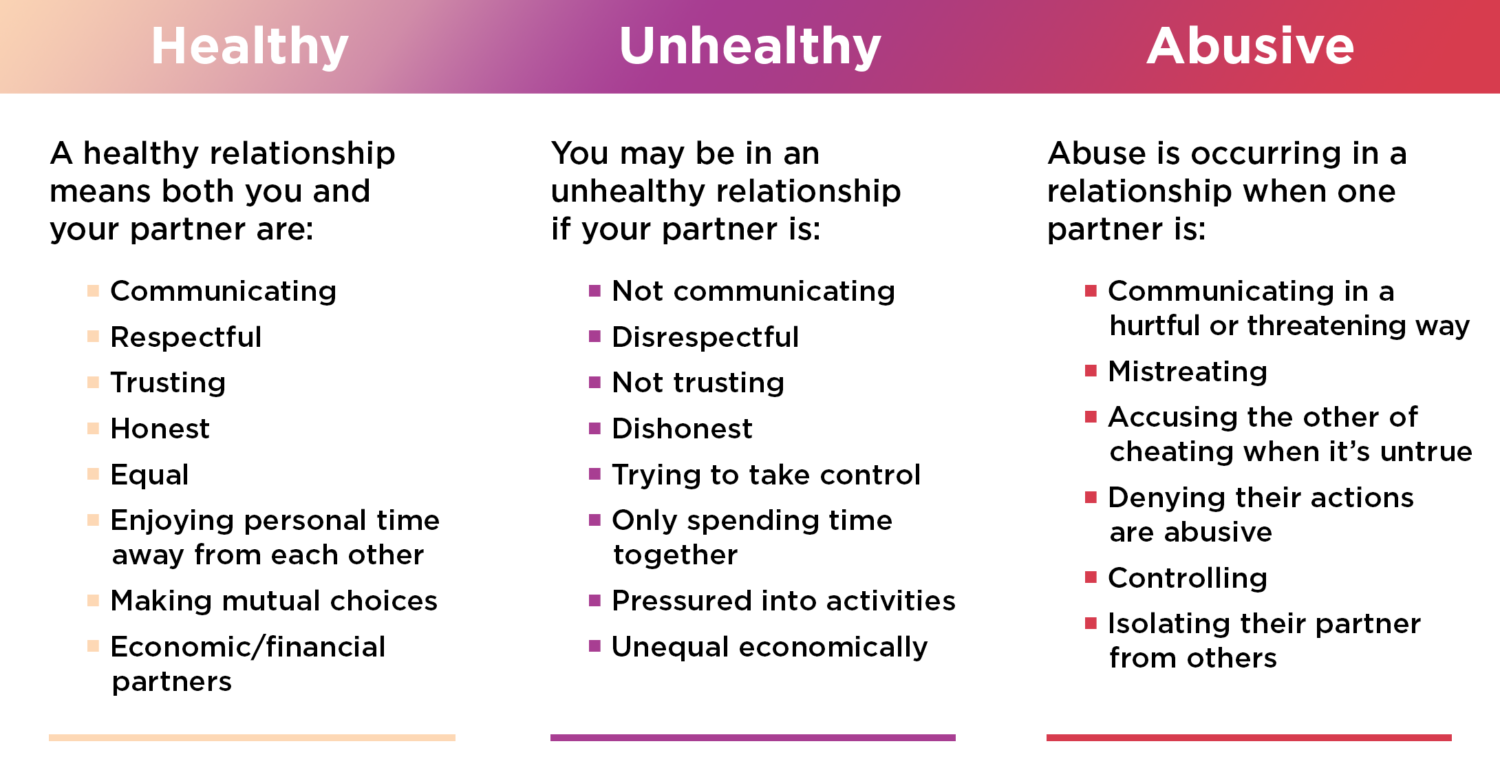What makes a relationship work?
Healthy Relationships
Communication, boundaries, consent, trust, equality, and healthy conflict resolution are all important parts of a relationship. A healthy relationship starts with mutual respect, including respect for each other's emotional, physical and digital boundaries. Setting boundaries can be an ongoing process in a relationship.
Boundaries: A Foundation of Relationships
If you answered “no” to one or more questions below, this could be an indication that you and your partner might want to work on creating more boundaries in your relationship, or that you might want to assess for red flags for unhealthy or abusive dynamics in the relationship.
Does each partner get the space they need to live healthy lives as individuals?
It’s healthy to spend time away from your partner and avoid controlling their whereabouts or who they spend time with. Everyone should feel free to spend time alone or with friends and family without having to get permission from their partner or check in and explain their whereabouts. Respecting personal space is important, and not doing so could indicate trust issues.
Is intimacy comfortable and consensual at all times?
Consent is crucial in any relationship, regardless of its duration. Sex should never feel obligatory, and you should always feel that your partner cares about your comfort and boundaries. Discussing boundaries and communication around sex with your partner beforehand is helpful, but it’s important to remember that you always have the right to say no. Check out this resource to learn more about consent in healthy relationships.
Is there mutual respect for privacy?
You have the right to privacy in a relationship, including keeping personal information like passwords to yourself. Sharing passwords is optional, and even if you do share, it doesn’t give your partner the right to snoop without permission. You can discuss with your partner what you’re comfortable sharing and establish boundaries around privacy.
Does each partner respect boundaries?
You have the right to set boundaries in a relationship, and it’s important to communicate them without fear of your partner’s reaction. Healthy relationships prioritize respect and comfort, and understanding each other’s boundaries helps to maintain that. If your partner uses pressure, guilt, or arguments to challenge your boundaries, or if they’re not being respected, it may be a sign of an unhealthy or abusive relationship.
All relationships exist on a spectrum
Relationship Spectrum: Healthy, Unhealthy, and Abusive
Relationships involve many aspects of empowerment and support, even during conflict. Using the relationship spectrum as a lens helps identify whether your relationship may be abusive.
Healthy Relationships
A healthy relationship means that both you and your partner are:
- Communicative. You talk openly about problems and listen to one another. You respect each other’s opinions.
- Respectful. You value each other’s opinions, feelings, and needs, and give each other the freedom to be yourself and be loved for who you are.
- Trusting. You believe what your partner has to say and don’t feel the need to “prove” each other’s trustworthiness.
- Honest. You’re honest with each other but can still keep some things private.
- Equal. You make decisions together and hold each other to the same standards. You and your partner have equal say with regard to major decisions within the relationship. All partners have access to the resources they need.
- Setting boundaries. You enjoy spending time apart, alone, or with others. You respect each other’s need for time and space apart. You communicate with each other about what you are and aren’t comfortable with.
- Practicing consent. You talk openly about sexual and reproductive choices together. All partners always willingly consent to sexual activity and can safely discuss what you are and aren’t comfortable with.
- Parenting supportively. All partners are able to parent in a way that they feel comfortable with. You communicate together about the needs of the child(ren), as well as the needs of the parents.
Unhealthy Relationships
You may be in an unhealthy relationship if your partner is:
- Non-communicative. When problems arise, you fight or you don’t discuss them at all.
- Disrespectful. You or your partner behave inconsiderately toward the other.
- Not trusting. You or your partner refuse to believe the other or feel entitled to invade their privacy.
- Dishonest. You or your partner lie, omit, or obscure facts.
- Taking control. You or your partner takes steps to suggest that one’s desires and choices are more important than another’s.
- Isolating. Your partner restricts your contact with other people, either in person or online.
- Pressured into sexual activity. One partner uses pressure or guilt against another to coerce them into sexual acts or reproductive choices.
- Ignoring boundaries. It’s assumed or implied that only one partner is responsible for making informed decisions.
- Unequal economically. Finances aren’t discussed. Financial decisions are made unilaterally or it’s assumed that only one partner is in charge of finances.
Abusive Relationships
A relationship is abusive when your partner:
- Communicates harmfully. Your partner communicates or in a way that is hurtful, threatening, insulting, or demeaning.
- Mistreats the other. Your partner doesn’t respect your thoughts, feelings, decisions, opinions, or physical safety.
- Makes untrue accusations. Your partner accuses you of cheating or breaking the boundaries of your relationship. Your partner may escalate by creating situations where you need to “prove” your trustworthiness, like handing over your social media passwords.
- Controls the other. There’s no equality in your relationship. One partner makes decisions without the other’s input, or makes all of the decisions in certain parts of the relationship, like finances.
- Isolates the other. Your partner controls where you travel, who you talk to, or how you spend your time. This often includes physical or emotional isolation from your family and friends.
- Forces sexual activity or controls reproductive choices. Your partner forces or pressures you to engage in sexual activity you don’t want to. Your partner controls your reproductive choices by sabotaging birth control, or by pressuring you to have or not have children.
- Controls finances. Your partner controls the money and access to resources, including preventing you from earning an income or accessing their own income. Having an open, respectful dialogue about finances is not an option.
- Manipulates children. Your partner uses your children to gain power and control over you, including telling them lies or baseless criticisms about you.
Posts on relationship skills
Parts of Healthy Relationships
Communication
Open, honest communication should be part of every healthy relationship. The guidelines below can help open up the channels of communication between you and your partner. If you're in an unhealthy or abusive relationship, use these tips with caution. You know your relationship best. If any of these tips would put you in danger, we…
Read More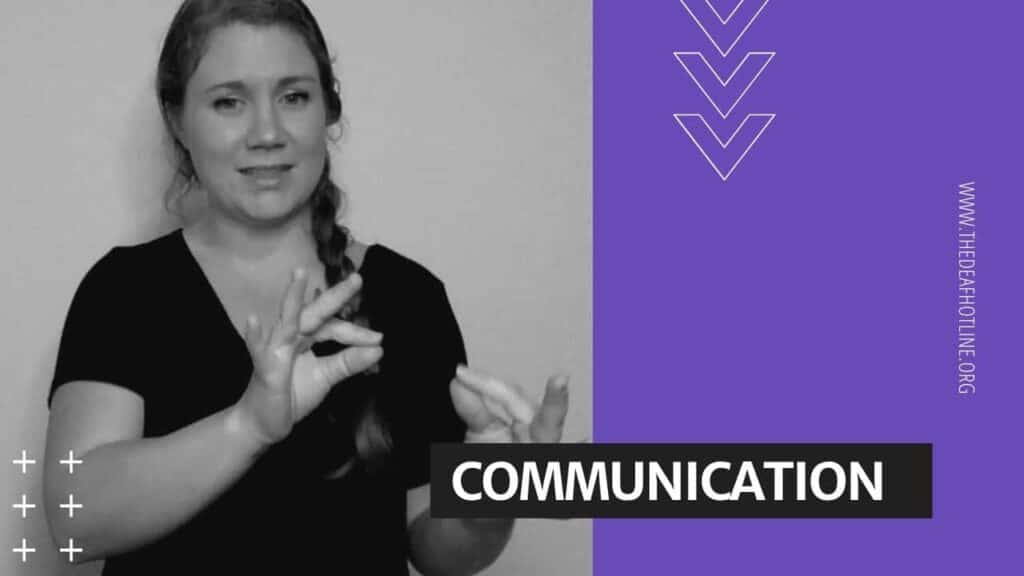
Equality
Everyone deserves to be in a healthy relationship where both partners are treated like equals, all the time. Equality can mean different things to different partners; what matters most is how you and your partner define it for your relationship on an ongoing basis. It's important to communicate openly about the balance in your relationship,…
Read More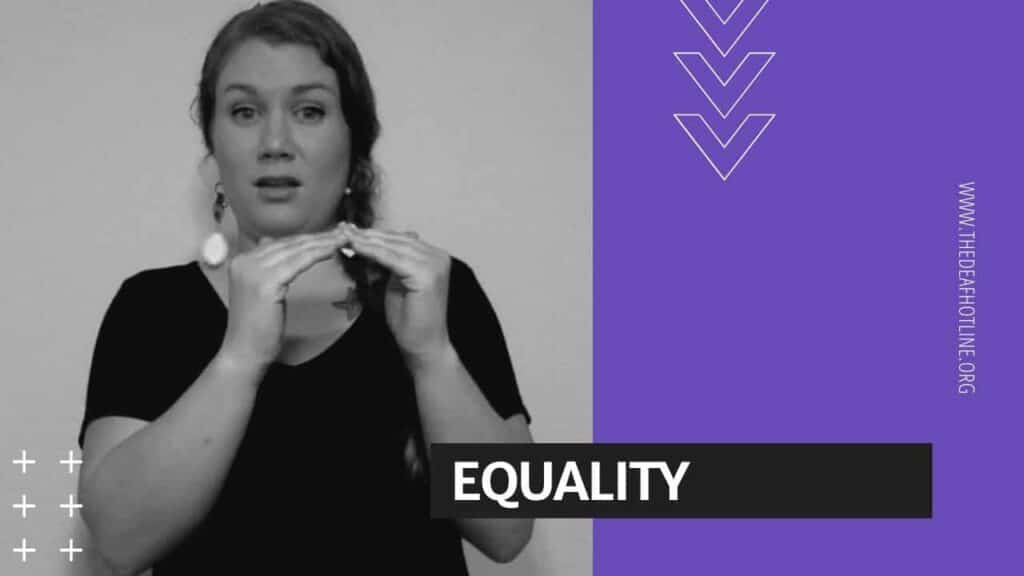
Consent
Consent is about open, honest communication. Consent is a mutual agreement about what people want to experience. When it comes to consent, the phrase “no means no” doesn't really provide a complete picture because it puts the responsibility on one person to resist or accept. People communicate in different ways that they're not comfortable with…
Read More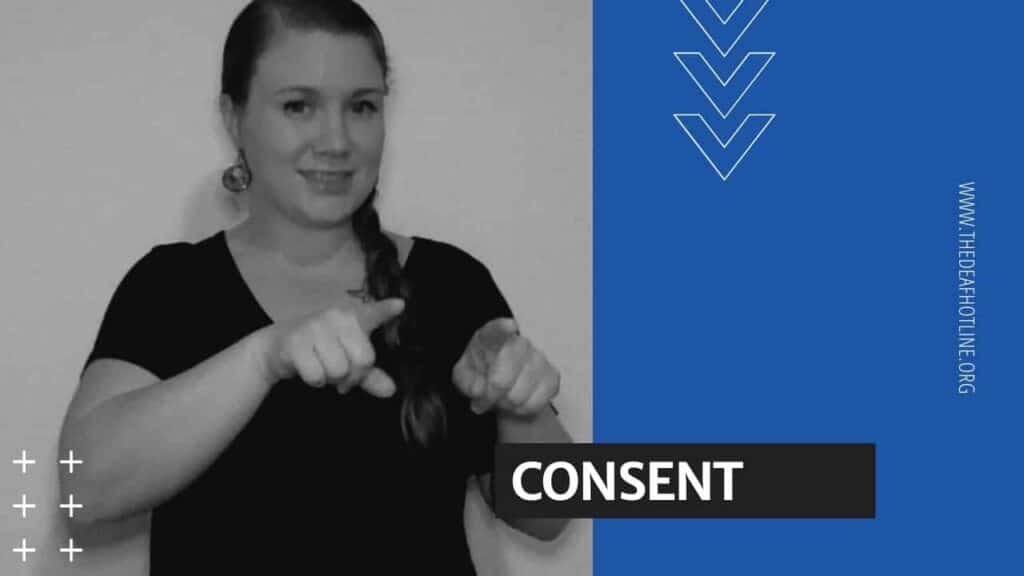
Trust
Trust is an important part of a healthy relationship, but it’s something that many people struggle with, for a lot of different reasons. What does trust mean? Trusting someone means that you think they are reliable, you have confidence in them and you feel safe with them physically and emotionally. Trust is something that two…
Read More
Healthy Conflict Resolution
Conflicts, such as verbal disagreements and arguments, happen in every relationship. While conflict is normal, it could also be a sign that parts of your relationship aren’t working. Healthy communication skills are the key to resolving conflict respectfully. When conflict arises, the tips below can help you resolve these arguments in a healthy way: Conflict…
Read More